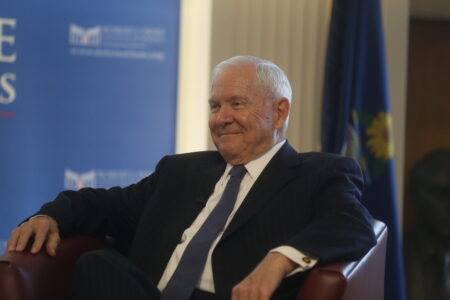Former U.S. defense secretary tells Lawrence crowd views on battles ranging from higher education to China conflict

photo by: Chad Lawhorn/Journal-World
Robert Gates, former U.S. Secretary of Defense, speaks at the Dole Institute of Politics at the University of Kansas on April 30, 2025.
Robert Gates — the former U.S. Secretary of Defense — was in Lawrence Wednesday to speak at a conference examining the prospect of war with China, which he says is very preventable, by the way.
But to a capacity crowd at the Dole Institute of Politics, Gates caught the attention of the crowd with talk of a different front line that creates plenty of skirmishes in Lawrence and other college towns like it.
Gates, who previously served as the president of Texas A&M University and currently is the chancellor of William & Mary, delved into the declining reputation of higher education, and said universities shouldn’t believe they are blameless.
Some parts of the university in particular have quite a bit to mull, he said.
“I think the social sciences have to do some hard thinking about kind of why they are on the front line,” Gates said in response to an audience question about declining confidence in higher education.
Gates contended that the public’s perception of higher education isn’t equally jaded across the board. He said in the areas of engineering, science, medicine, business and other such areas, complaints about the value of higher education and its performance are few.
“It is mainly the social sciences that are the source of concern,” Gates said. “Frankly there is a problem in a lot of universities in terms of one-sided teaching in history, government and even economics.”
Gates told a story of a young friend who had a professor in a local community college who constantly talked about how capitalism was a bad system and far inferior to socialism.
“Really? I thought we sort of had some evidence of how that worked,” said Gates, who was a Cold War warrior not only as a secretary of defense but also a career CIA officer who went on to lead the agency in the early 1990s.
Gates said it is anecdotes like those that higher education needs to be able to counter with the public.
“I think one thing universities are going to have to pay more attention to in that arena is making sure there is a balance of teaching both sides of these issues, and giving students the sense that they don’t have to believe in what the professor tells them or believe what the professor believes in,” he said. “If you disagree with the professor, that is OK, as long as you can support your arguments.”
Gates was in Lawrence to speak as part of the 7th Annual Intelligence & National Security Colloquium hosted by KU. The two-day event — which has drawn participants from as far as South Korea, KU Chancellor Douglas Girod told the crowd — has a focus on China and how it may react to growing tensions with the U.S. Gates shared several thoughts on that topic including:
• Chinese leader Xi Jinping probably thinks he has a better hand to play than the U.S. in the tariff battle that is underway. Gates said the biggest advantage is the Chinese system of government is better built to remain patient for a longer period of time than political leaders in the U.S..
“I don’t think there is anybody in the world better at taking the long view than Chinese leaders,” Gates said.
• Xi’s biggest worry, Gates suspects, is China’s unemployment rate of more than 20%, and how a slowdown of exports due to tariffs could cause that number to spike. But Gates said the U.S. may be underestimating how secondary the economy has become to Xi’s calculations. He said Xi’s defining decision as Chinese ruler has been to put the security and stability of the Chinese Communist Party ahead of the goals of the overall Chinese economy.
• Xi cannot show any weaknesses in dealing with the U.S. or the Trump administration, Gates said. He also said after watching the infamous White House meeting between Trump and Ukrainian President Volodymyr Zelenskyy, Xi will not have any conversation with Trump that isn’t highly controlled. If Trump is waiting for Xi to start negotiations on a trade deal, Gates predicted the president will be waiting a long time.
“He won’t be the first one to pick up the phone,” Gates said of Xi.
• Gates does not think Xi is likely to make a major military move during this time of tension with the U.S. While he thinks China’s goals of having dominance over Hong Kong, Taiwan and the South China Sea are now clear, he believes Xi is willing to be patient in those goals. He said Trump’s unpredictability as a leader likely gives Xi second thoughts about becoming too aggressive militarily.
Gates also told the crowd he doesn’t think an armed conflict between the U.S. and China is inevitable. He said the U.S. and the Soviet Union competed fiercely for decades without a direct war breaking out between the two, and so too can the U.S. and China.
“There is no reason why we can’t co-exist with China,” Gates said. “I think a realistic approach would be if we can avoid a military confrontation, to keep the competition and rivalry focused on those non-military instruments of power. Compete economically, compete technologically, compete for influence in other countries.
There is no reason we can’t do that, but it will require the two countries to have the type of dialogue we haven’t been having for a long time.”







